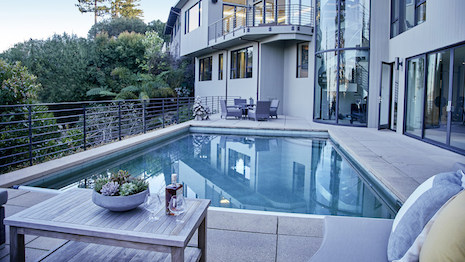- About
- Subscribe Now
- New York,
August 10, 2018

 Seven of the 20 fastest-growing luxury markets are in Northern California. Image credit: Sotheby's International Realty
Seven of the 20 fastest-growing luxury markets are in Northern California. Image credit: Sotheby's International Realty
Luxury home sales in the United States continue to be on the upswing, with 19 markets hitting double-digit growth in July.
Realtor.com's Luxury Home Index analyzed the top 5 percent of all residential sales, considered the entry-level luxury price tier, in 91 counties. The number of sales at or above $1 million rose 12 percent from last year.
"The most surprising finding to me was the continued prevalence of strength in luxury markets," said Danielle Hale, chief economist for Realtor.com, Santa Clara, CA. "I'm surprised that we're seeing the number of areas with double-digit price growth increasing. It's the most we've seen since 2014."
Fast-growing markets
As demand for luxury homes grows amid faster marketing times, the entry level for these homes has been pushed upwards. Forty-nine of the 91 markets surveyed have an entry point of at least $1 million.
Two-thirds of markets have seen real estate marketing time decrease. The combined median age of inventory in all of the luxury markets examined is down 9.3 percent year-over-year, from 119 to 108 days.
Sarasota, FL is the fastest-growing luxury market. Image credit: Realtor.com
Sarasota on Florida's Gulf Coast continues to be the fastest-growing luxury market, with prices up 21.2 percent since last May. With an entry point just above $1 million, half of the luxury homes in Sarasota are selling within 157 days.
Queens, NY; Maui, HI; Santa Clara, CA and Boulder, CO round out the top five fastest-growing luxury markets. Of those counties, Santa Clara has the highest entry point at $2.8 million, but that has not stopped the market from growing 14 percent year-over-year.
Seven of the 20 fastest-growing luxury markets are in Northern California, including Santa Cruz, San Mateo, Sonoma, Marin and the aforementioned Santa Clara. While mid-market homes in the Bay Area have seen prices fall, entry-level luxury prices are up at least 9 percent, depending on the county.
After a slowdown in 2017, Colorado luxury real estate prices are up. Image credit: Realtor.com
In Colorado, Denver and Douglas counties saw double-digit growth alongside Boulder. Luxury homes in Denver and Boulder usually sell in less than 95 days, marking a turnaround for a state whose real estate market stagnated in early 2017.
"I think the southwest Florida and Colorado luxury markets will certainly continue to grow," Ms. Hale said. "In the past, these areas have sustained several months of double-digit growth in luxury entry prices."
In the New York metropolitan area, Queens and nearby Hudson County, NJ are experiencing double-digit price growth, while Manhattan has seen real estate activity steadily decline (see story). With an entry point of $1.3 million, however, price growth has stopped, which may be an indication of another plateau in the area.
Closer look
While Realtor.com's Luxury Home Index looks at the big picture of the luxury real market, forecasts for growth become muddier when taking a closer look at big cities.
According to Knight Frank’s Prime Global Cities Index for the second quarter of 2018, several urban luxury residential markets are growing at a slower rate.
San Francisco and Los Angeles both ranked in the top 10 for annual price growth. The former grew 9.5 percent, ranking fourth overall, and the latter grew 7.8 percent.
On the East Coast, real estate growth was much slower. Miami improved 3.3 percent, while New York saw a bump of just 0.1 percent (see story).
The most expensive ZIP codes in the United States are concentrated on the West Coast, according to PropertyShark. Nonetheless, data shows that the nation's wealthiest people tend to live in the opposite side of the country, an interesting datapoint that should be on any luxury real estate developer's mind (see story).
"So as long as the economy keeps growing, I think this strong pace [of growth] will be the norm," Realtor.com's Ms. Hale said.
Share your thoughts. Click here